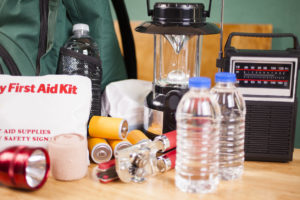 In today’s world, emergencies can happen for many reasons—from weather and aging components to accidents that are simply out of your control. Understanding what things can go wrong in emergencies can allow you to prepare your rental properties to handle unforeseen accidents and keep your investment and tenants safe. To start preparing for future situations, it’s important to know the impact of each situation.
In today’s world, emergencies can happen for many reasons—from weather and aging components to accidents that are simply out of your control. Understanding what things can go wrong in emergencies can allow you to prepare your rental properties to handle unforeseen accidents and keep your investment and tenants safe. To start preparing for future situations, it’s important to know the impact of each situation.
For general emergency prevention, ensure your tenants are encouraged to speak up if they notice anything awry, as they’ll likely notice any hazards much sooner than you. The key to safety is early intervention and prevention. With the help of your tenants, many potential house fires, floods, and other emergencies can be avoided.
Another tip that’s great for all emergency preparation is to document all the precautions you have in place. This documentation will help during insurance purposes, but it will also ensure you don’t forget to check anything when performing a routine safety check of the property.
Power Outages
Emergency floodlights are a good idea to have around your property during power outages. Otherwise, your tenants may be tempted to use candles. Even though candles are a tradition for power outages, they can be dangerous if your tenants forget to blow them out or carry a lit candle from room to room.
Power outages are one of the most common events that would be classified as an emergency, so it makes sense to have more preparations in place. For example, it’s a good idea to consider installing a backup generator, or even a home battery pack. These can make a frustrating situation much easier to deal with and have the added benefit of avoiding upset phone calls from your tenants if the power goes out, especially if they work from home.
 Of course, there are simpler upgrades to make to the property, such as surge-protected outlets for appliances. After all, power surges go hand-in-hand with power outages. If you decide to have appliances included in your rental, it’ll be much cheaper to have enough surge-protected outlets installed than to replace fried appliances.
Of course, there are simpler upgrades to make to the property, such as surge-protected outlets for appliances. After all, power surges go hand-in-hand with power outages. If you decide to have appliances included in your rental, it’ll be much cheaper to have enough surge-protected outlets installed than to replace fried appliances.
House Fires
A common fire hazard in older homes is outdated electrical components. It’s important that a qualified electrician evaluates your electrical system to determine if the functional capacity is adequate for your intentions. Outdated components can lead to fires as modern homes and appliances draw a significantly greater amount of electricity than older homes, leading to overloads and fires.
For fire prevention, smoke alarms should be near kitchens and bedrooms while carbon monoxide alarms should be near heating vents. Fire extinguishers should also be easily accessible with effective indicators for tenants to find them. A good idea is to place them by the entryway of rooms, such as the kitchen or living area. House fires are less likely to block access to extinguishers in doorways than, for example, an extinguisher placed under the kitchen sink.
Home Flooding
Finally, house floods are one of the last common emergencies that you should prepare for. The most important piece of information for a flood coming from inside the house is the location of the water shut-off valves. Making sure both you and your tenants know where these are located can significantly reduce the extent of resulting water damage.
Additionally, if the property has a basement, it’s a good idea to have a sump pump available. You don’t want to have to try and go out to buy a sump pump when your basement has already flooded, especially if it’s caused by weather in your area. Immediately removing water will give you some invaluable time to begin sorting out the situation.
How to Prepare for Preparation Costs
Making upgrades to your property may not be something you’ve budgeted for, but there are plenty of ways to help afford such alterations. While most companies will be happy to let you finance the work, shop around for different interest rates so you know that you’re getting the best deal.
If you’ve owned the property for a number of years already, then it’s definitely worth it to look into using your property’s equity, such as through a home equity line of credit. Using a HELOC will allow you to take out only as much as you need to afford the alterations, rather than one large lump sum that will all be accruing interest as soon as it’s able to. Using your home’s equity is a great way to secure competitive interest rates. Utilizing free in-home estimates is a great way to make sure you map out exactly how much money you need.
Emergencies are never something that is easy to deal with, but with effective preparations, the stress of emergencies can be mitigated. Additionally, your preparations will help to ensure that your tenants are safe and your investment is protected. Happy tenants are renewing tenants. Even though emergencies can’t be prevented, the extent of their impact can be.
We are pledged to the letter and spirit of U.S. policy for the achievement of equal housing opportunity throughout the Nation. See Equal Housing Opportunity Statement for more information.


